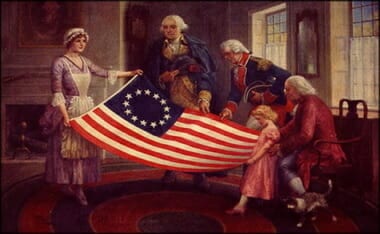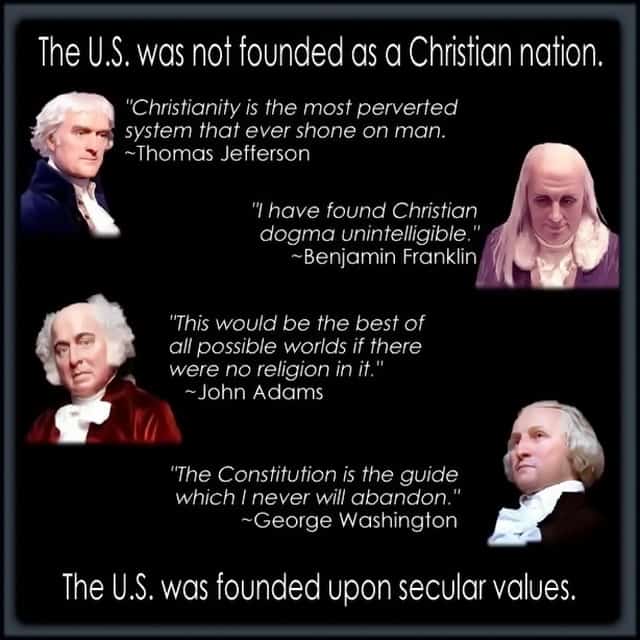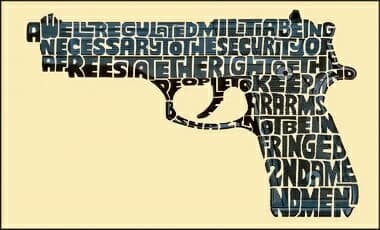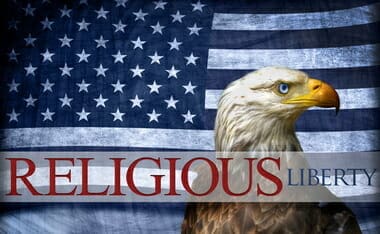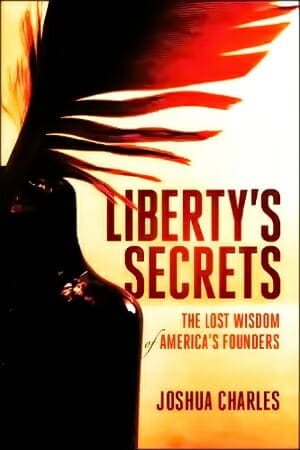JUMP TO:
Did the Founding Fathers want American society to be religious or secular? Joshua Charles, author of Liberty’s Secrets, explains.
What did the Founding Fathers believe about religion? Were they Christians, or just deists? Did they believe in secularism, or did they want Americans to be religious? Joshua Charles, New York Times bestselling author and researcher at the Museum of the Bible, explains.
UPDATED w/ Combined Posts
A Facebook friend posts a lot of stuff from the Left. And while I could spend all day refuting in similar fashion much of it (like the below), this topic caught my eye. Here is the FB graphic she posted on her wall:
So, let’s deal with these in order, shall we?
THOMAS JEFFERSON
This is the headline at THE JEFFERSON MONTICELLO site: “Christianity is the most perverted system that ever shone on man (Spurious Quotation)” — spurious indeed. They follow this with the fuller quote:
This comment on Christianity is a somewhat paraphrased excerpt from the following letter written by Thomas Jefferson to Joseph Priestley:
“this was the real ground of all the attacks on you: those who live by mystery & charlatanerie, fearing you would render them useless by simplifying the Christian philosophy, the most sublime & benevolent, but most perverted system that ever shone on man, endeavored to crush your well earnt, & well deserved fame.” – Jefferson to Priestley, March 21, 18011 (entire letter)
There are other useful links at MONTICELLO’S link to this topic. Even CHECK YOUR FACT has this regarding the Jefferson quote:
Verdict: False
There is no evidence that Jefferson ever said or wrote this. His estate at Monticello includes the saying on its list of “spurious quotations.”
Fact Check:
The quote has been frequently attributed to Jefferson on social media, appearing in numerous memes and posts on Facebook.
However, the Daily Caller found no record of Jefferson ever saying or writing this expression. A search of the Papers of Thomas Jefferson returned no results matching the alleged saying. It doesn’t appear in a collection of his quotes and letters either.
His estate at Monticello also includes the statement on its list of “spurious quotations.” The first known appearance in print dates back to 1996, according to the Thomas Jefferson Foundation…..
Did Thomas Jefferson dislike religion? Ben Shapiro speaks with author and Wallbuilders founder David Barton about Jefferson and his version of the Bible.
But history is more complex than your meme.
BENJAMIN FRANKLIN
The fuller quote reads… and note, many say this about their youth as well. I say similar things — as I stayed out of the church as a youth when I could.
- “I have found Christian dogma unintelligible. Early in life I absented myself from Christian assemblies.”
Later in life however, Franklin (and I would say myself) wrestled with religious matters well, and came out on the theistic end of life. Here, for example, is a letter from Benjamin Franklin to the “atheist” Thomas Paine:
TO THOMAS PAINE.
[Date uncertain.]
DEAR SIR,
I have read your manuscript with some attention. By the argument it contains against a particular Providence, though you allow a general Providence, you strike at the foundations of all religion. For without the belief of a Providence, that takes cognizance of, guards, and guides, and may favor particular persons, there is no motive to worship a Deity, to fear his displeasure, or to pray for his protection. I will not enter into any discussion of your principles, though you seem to desire it. At present I shall only give you my opinion, that, though your reasonings are subtile and may prevail with some readers, you will not succeed so as to change the general sentiments of mankind on that subject, and the consequence of printing this piece will be, a great deal of odium drawn upon yourself, mischief to you, and no benefit to others. He that spits against the wind, spits in his own face.
But, were you to succeed, do you imagine any good would be done by it? You yourself may find it easy to live a virtuous life, without the assistance afforded by religion; you having a clear perception of the advantages of virtue, and the disadvantages of vice, and possessing a strength of resolution sufficient to enable you to resist common temptations. But think how great a portion of mankind consists of weak and ignorant men and women, and of inexperienced, inconsiderate youth of both sexes, who have need of the motives of religion to restrain them from vice, to support their virtue, and retain them in the practice of it till it becomes habitual, which is the great point for its security. And perhaps you are indebted to her originally, that is, to your religious education, for the habits of virtue upon which you now justly value yourself. You might easily display your excellent talents of reasoning upon a less hazardous subject, and thereby obtain a rank with our most distinguished authors. For among us it is not necessary, as among the Hottentots, that a youth, to be raised into the company of men, should prove his manhood by beating his mother.
I would advise you, therefore, not to attempt unchaining the tiger, but to burn this piece before it is seen by any other person; whereby you will save yourself a great deal of mortification by the enemies it may raise against you, and perhaps a good deal of regret and repentance. If men are so wicked with religion, what would they be if without it. I intend this letter itself as a proof of my friendship, and therefore add no professions to it; but subscribe simply yours,
B. Franklin
Other interesting items of Mr. Franklin’s faith in God can be found here: “Benjamin Franklin Was Not A Secularist“
I start out this upload with a call into the show this week… after a little back-n-forth it ends. BUT, I include a bit of the show Dennis Prager speaks about during the call. That is from late February. A great topic covered well. Here is the creed spoken of:
✦ I believe in one God, the creator of the universe.
✦ That he governs by his providence.
✦ That he ought to be worshipped.
✦ That the most acceptable service we render to him is doing good to his other children.
✦ That the soul of man is immortal, and will be treated with justice in another life respecting its conduct in this.
For a very good discussion of the influence of the Calvinistic tradition on the thinking of Benjamin, see:
- John Eidsmoe, Christianity and the Constitution: The Faith of Our Founding Fathers (Grand Rapids: Baker Book House, 1987), 191-213.
JOHN ADAMS
The fuller quote from Adam’s sheds some light on Calvinism’ influence on the founders. The quote was taken out of context from a letter from John Adams to Thomas Jefferson, 19 April 1817 (entire letter):
- Twenty times, in the course of my late Reading, have I been upon the point of breaking out, “This would be the best of all possible Worlds, if there were no Religion in it”!!! But in this exclamati[on] I Should have been as fanatical as Bryant or Cleverly. Without Religion this World would be Something not fit to be mentioned in polite Company, I mean Hell. So far from believing in the total and universal depravity on human Nature; I believe there is no Individual totally depraved.
A slightly more English friendly version is this:
“Twenty times, in the course of my late reading, have I been on the point of breaking out, ‘this would be the best of all possible Worlds, if there were no Religion in it!!!’ But in this exclamation, I should have been as fanatical as Bryant or Cleverly. Without religion, this world would be something not fit to be mentioned in public company – I mean hell.” (Charles Francis Adams [ed.], The Works of John Adams, 10 vols. [Boston, 1856], X, p. 254.)
- Taken from They Never Said It: A Book of Fake Quotes, Misquotes, & Misleading Attributions, by Paul F. Boller, Jr. & John George, p. 3.
Adam’s was using the quote as a hyperbolic analogy to make a larger point. The opposite point as displayed in the meme. And the point was the depravity of mankind in a VERY Calvinistic structure. Here, as a way to drive the point home that this topic — that is, religious influences on the founding of America — is a topic I have for seminary studied well. Here is a bibliography of books used for a class. Books that sit on my shelves, I will highlight one in particular I recommend:
BIBLIOGRAPHY
Atkinson, James. The Great Light: Luther and the Reformation (Eugene, OR: Wipf and Stock, 2006).
Barton, David. America’s Godly Heritage (Aledo, TX: Wallbuilders Press, 1993).
___________. Original Intent: The Courts, the Constitution, & Religion, 3rd ed. (Aledo, TX: Wallbuilders Press, 2000).
Belloc, Hilaire. The Protestant Reformation (Rockford, IL: Tan Books and Publishers, 1928).
___________. Characters of the Reformation: Historical Portraits of 23 Men and Women and Their Place in the Great Religious Revolution of the 16th Century (Rockford, IL: Tan Books and Publishers, 1936).
Berman, Harold J. Law and Revolution II: The Impact of the Protestant Reformations on the Western Legal Tradition (Cambridge, MA: Harvard University Press, 2003).
_____________. Law and Revolution: The Formation of the Western Legal Tradition (Cambridge, MA: Harvard University Press, 1983).
Eidsmoe, John. Christianity and the Constitution: The Faith of Our Founding Fathers (Grand Rapids, MI: Baker Books, 1987).
Esolen, Anthony. The Politically Incorrect Guide to Western Civilization (Washington, DC: Regnery, 2008).
Estep, William R. Renaissance and Reformation (Wm B. Eerdmans Publishing Company, 1986).
Evans, M. Stanton. The Theme is Freedom: Religion, Politics, and the American Tradition (Washington, DC: Regnery, 1994).
George, Timothy. Theology of the Reformers (Nashville, TN: Broadman & Holman, 1988).
Hannah, John D. Charts of Reformation and Enlightenment Church History (Grand Rapids, MI: Zondervan Publishing House, 2004).
Hillerbrand, Hans J. The Reformation: A Narrative History Related by Contemporary Observances and Participants (New York, NY: Harper & Row, 1964).
___________. How the Reformation Happened (New York, NY: Harper Perennial, 1968).
Hoffecker, W. Andrew. Revolutions in Worldviews: Understanding the Flow of Western Thought (Phillipsburg, NJ: P & R, 2007).
House, Wayne H. Charts of Christian Theology & Doctrine (Grand Rapids, MI: Zondervan Publishing House, 1992).
_____________. Charts on Systematic Theology ( Grand Rapids, MI: Kregel, 2006).
Lowenthal, David. No Liberty for License: the Forgotten Logic of the First Amendment (Dallas, TX: Spence Publishing, 1997).
MacCullouch, Diarmaid. The Reformation: A History (New York, NY: Penguin, 2004).
Marshall, Paul. God and the Constitution: Christianity and American Politics (Lanham, MD: Rowman & Littlefield, 2002).
McGrath, Alister E. Reformation Thought: An Introduction, 3rd ed. (Malden, MA: Blackwell Publishing, 1999).
______________, ed. The Christian Theology Reader (Malden, MA: Blackwell Publishers, 1995).
Nichols, Stephen J. The Reformation: How a Monk and a Mallet Changed the World (Wheaton, IL: Crossway Books, 2007).
Noll, Mark A. America’s God: From Jonathan Edwards to Abraham Lincoln (New York, NY: Oxford University Press).
Olberman, Heiko A. The Dawn of the Reformation: Essays in Late Medieval and Early Reformation Thought (Wm B. Eerdmans Publishing Company, 1992).
Parker, G.W.H. The Morning Star: Wycliffe and the Dawn of the Reformation (Eugene, OR: Wipf and Stock, 2006).
Pelikan, Jaroslav, Reformation of Church and Dogma (1300-1700), vol. 4 (Chicago, IL: University of Chicago Press, 1984).
Sandoz, Ellis, ed. Political Sermons of the American Founding Era: 1730-1805 (Indianapolis, IN: Liberty Fund, 1991).
Sharansky, Natan. Defending Identity: It’s Indispensible Role In Protecting Democracy (New York, NY: Public Affairs, 2008).
Skinner, Quentin. The Foundations of Modern Political Thought: The Age of Reformation, vol. 2 (New York, NY: Cambridge University Press, 1978).
_____________. The Foundations of Modern Political Thought: The Renaissance, vol. 1 (New York, NY: Cambridge University Press, 1998).
_____________. Liberty Before Liberalism (New York, NY: Cambridge University Press, 1998).
Spellman, W.M. John Locke and the Problem of Depravity (New York, NY: Oxford University Press, 1988).
Stark, Rodney. The Victory of Reason: How Christianity Led to Freedom, Capitalism, and Western Success (, New York, NY: Random House, 2006).
_____________. For the Glory of God: How Monotheism Led to Reformations, Science, Witch-Hunts, and the End of Slavery (Princeton, NJ: Princeton university Press, 2004)
Tomkins, Stephen. A Short History of Christianity (Wm B. Eerdmans Publishing Company, 2005).
Walton, Robert C. Chronological and Background Charts of Church History: Revised and Expanded (Grand Rapids, MI: Zondervan Publishing House, 2005).
Witte, John Jr. Religion and American Constitutional Experiment (Boulder, CO: Westview Press, 2005).
___________. The Reformation of Rights: Law, Religion, and Human Rights in Early Modern Calvinism (New York, NY: Cambridge University Press, 2007).
___________., and Frank s. Alexander, eds. Christianity and Law: An Introduction (New York, NY: Cambridge University Press, 2008).
___________. From Sacrament to Contract: Marriage, Religion, and Law in the Western Tradition (Louisville, KY: WJK, 1997)
___________. God’s Joust, God’s Justice: Law and Religion in the Western Tradition (Wm B. Eerdmans Publishing Company, 2006).
___________. Law and Protestantism: The Legal Teachings of the Lutheran Reformation (New York, NY: Cambridge University Press, 2002).
Woods, Thomas J. Jr. The Politically Incorrect Guide to American History (Washington, DC: Regnery, 2004).
Later in life, Adams wrote:
- “I love and revere the memories of Huss, Wickliff, Luther, Calvin, Zwingli, Melancton, and all the other Reformers, how muchsoever I may differ from them all in many theological metaphysical & philosophical points. As you justly observe, without their great exertions & severe sufferings, the USA had never existed.” — John Adams to F. C. Schaeffer, November 25, 1821, in James Hutson, ed., The Founders on Religion: A Book of Quotations (Princeton: Princeton University Press, 2005), 15–16.
GEORGE WASHINGTON
The quote by our first official President does not even hint at secular thought? The entire letter in fact does not. An excellent site recording the non-secular events surrounding the Constitution, also note the following — to use just one example from the many via Is the Constitution a “Secular Document?”
…After being sworn in, George Washington delivered his “Inaugural Address” to a joint session of Congress. In it Washington declared:
[I]t would be peculiarly improper to omit in this first official act my fervent supplications to that Almighty Being who rules over the universe, who presides in the councils of nations, and whose providential aids can supply every human defect, that His benediction may consecrate to the liberties and happiness of the people of the United States a Government instituted by themselves . . . . In tendering this homage to the Great Author of every public and private good, I assure myself that it expresses your sentiments not less than my own, nor those of my fellow-citizens at large less than either. No people can be bound to acknowledge and adore the Invisible Hand which conducts the affairs of men more than those of the United States. Every step by which they have advanced to the character of an independent nation seems to have been distinguished by some token of providential agency; and . . . can not be compared with the means by which most governments have been established without some return of pious gratitude, along with an humble anticipation of the future blessings which the past seem to presage.
[W]e ought to be no less persuaded that the propitious smiles of Heaven can never be expected on a nation that disregards the eternal rules of order and right which Heaven itself has ordained….
-
- Messages and Papers of the Presidents, George Washington, Richardson, ed., vol. 1, p.44-45
Following his address, the Annals of Congress reported that:
The President, the Vice-President, the Senate, and House of Representatives, &c., then proceeded to St. Paul’s Chapel, where Divine service was performed by the chaplain of Congress.
These people obviously didn’t get the memo about the Constitution creating a secular government…..
More on Washington can be found HERE.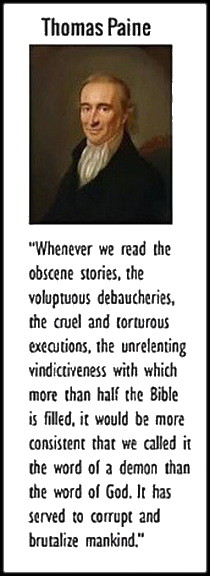
In recent conversation a similar meme was sent to me that added Thomas Pain. So here is a quick dealing with this that should add more context to Mr. Pain’s complexity that is not represented in the “out of context” thoughts in full he had about the subject.
THOMAS PAIN UPDATE
Many posit that Thomas Pain was a deist. The problem is that Pain had issues with God, yes, but “deism” represented in thought of the 1700’s is a bit different than what the 21st century mind posits. Obviously he is no Evangelical Christian, but neither is he “anti-God.” For instance:
Even Thomas Paine, in his discourse on “The Study of God,” forcefully asserts that it is “the error of schools” to teach sciences without “reference to the Being who is author of them: for all the principles of science are of Divine origin.” He laments that “the evil that has resulted from the error of the schools in teaching [science without God] has been that of generating in the pupils a species of atheism.” Paine not only believed in God, he believed in a reality beyond the visible world.
I wrote a post defining deism through a debate I had in the very early 2000s, here is a snippet of thought from that POST:
“A being who could [as deists believe] bring the universe into existence from nothing could certainly perform lesser miracles if He chose to do so. A God who created water could part it or make it possible for a person to walk on it. The immediate multiplication of loaves of bread and fish would be no problem to a God who created matter and life in the first place. A virgin birth or even a physical resurrection from the dead would be minor miracles in comparison to the miracle of creating the universe from nothing [as deists believe]. It seems self-defeating to admit a great miracle like creation and then to deny the possibility of lesser miracles.”
(Baker Encyclopedia of Christian Apologetics, by Norman L. Geisler, p. 189.)
Author Joshua Charles also succinctly catalogued Thomas Pain’s complexity of thought on the matter:
…Even Thomas Paine, who in the second half of his life was an ardent opponent of orthodox Christianity (mostly Catholicism) and the clergy and did not believe the Bible was divinely inspired, wrote at the same time, “All the principles of science are of divine origin. Man cannot make or invent or contrive principles. He can only discover them, and he ought to look through the discovery to the Author.”
Paine criticized any teaching of “natural philosophy” (i.e., science) that asserted that the universe was simply “an accomplishment” (i.e., self-existent). He also criticized those teachers who “labor with studied ingenuity to ascribe everything they behold to innate properties of matter and jump over all the rest by saying that matter is eternal” and thereby encouraged the “evil” of atheism. “Instead of looking through the works of creation to the Creator Himself, they stop short and employ the knowledge they acquire to create doubts of His existence,” he lamented. “When we examine an extraordinary piece of machinery, an astonishing pile of architecture, a well-executed statue, or a highly-finished painting… our ideas are naturally led to think of the extensive genius and talent of the artist. When we study the elements of geometry, we think of Euclid. When we speak of gravitation, we think of Newton. How, then, is it that when we study the works of God in creation, we stop short and do not think of God?”….
For more context, read Joshua Charles, Liberty’s Secrets: The Lost Wisdom of America’s Founders (Washington, DC: WND Books, 2015), 82-91.
Here is some more in-depth study of God and shows that what is ripped out of a lifetime does not do justice to the topic but merely reinforces presuppositions. First, a definition for the below:
- theophilanthropist: a member of a deistic society established in Paris during the period of the Directory aiming to institute in place of Christianity
Stedman and Hutchinson, comps. A Library of American Literature:
An Anthology in Eleven Volumes. 1891.
Vol. III: Literature of the Revolutionary Period, 1765–1787
The Study of God
By Thomas Paine (1737–1809)
[A Discourse delivered to the Society of Theophilanthropists at Paris.]
RELIGION has two principal enemies, Fanaticism and Infidelity, or that which is called atheism. The first requires to be combated by reason and morality, the other by natural philosophy.
The existence of a God is the first dogma of the Theophilanthropists….
The universe is the Bible of a true Theophilanthropist. It is there that he reads of God. It is there that the proofs of his existence are to be sought and to be found. As to written or printed books, by whatever name they are called, they are the works of man’s hands, and carry no evidence in themselves that God is the author of any of them. It must be in something that man could not make that we must seek evidence for our belief, and that something is the universe; the true Bible; the inimitable work of God.
Contemplating the universe, the whole system of creation, in this point of light, we shall discover that all that which is called natural philosophy is properly a divine study. It is the study of God through his works. It is the best study by which we can arrive at a knowledge of his existence, and the only one by which we can gain a glimpse of his perfection.
Do we want to contemplate his power? We see it in the immensity of the creation. Do we want to contemplate his wisdom? We see it in the unchangeable order by which the incomprehensible whole is governed. Do we want to contemplate his munificence? We see it in the abundance with which he fills the earth. Do we want to contemplate his mercy? We see it in his not withholding that abundance even from the unthankful. In fine, do we want to know what God is? Search not written or printed books, but the scripture called the Creation.
It has been the error of the schools to teach astronomy, and all the other sciences and subjects of natural philosophy, as accomplishments only; whereas they should be taught theologically, or with reference to the Being who is the author of them: for all the principles of science are of divine origin. Man cannot make, or invent, or contrive principles. He can only discover them; and he ought to look through the discovery to the Author.
When we examine an extraordinary piece of machinery, an astonishing pile of architecture, a well executed statue, or a highly finished painting, where life and action are imitated, and habit only prevents our mistaking a surface of light and shade for cubical solidity, our ideas are naturally led to think of the extensive genius and talents of the artist. When we study the elements of geometry, we think of Euclid. When we speak of gravitation, we think of Newton. How then is it, that when we study the works of God in the creation, we stop short, and do not think of God? It is from the error of the schools in having taught those subjects as accomplishments only, and thereby separated the study of them from the Being who is the author of them.
The schools have made the study of theology to consist in the study of opinions in written or printed books; whereas theology should be studied in the works or books of the creation. The study of theology in books of opinions has often produced fanaticism, rancor, and cruelty of temper; and from hence have proceeded the numerous persecutions, the fanatical quarrels, the religious burnings and massacres that have desolated Europe. But the study of theology in the works of the creation produces a direct contrary effect. The mind becomes at once enlightened and serene; a copy of the scene it beholds: information and adoration go hand in hand; and all the social faculties become enlarged.
The evil that has resulted from the error of the schools in teaching natural philosophy as an accomplishment only, has been that of generating in the pupils a species of atheism. Instead of looking through the works of the creation to the Creator himself, they stop short, and employ the knowledge they acquire to create doubts of his existence. They labor with studied ingenuity to ascribe everything they behold to innate properties of matter; and jump over all the rest, by saying that matter is eternal.
In a great synopsis of how complex people change over time, Pain’s pro-God arguments happened during the American Revolution and independence. Only later did he become more secular and defended atrocities like those in France. CHRISTIAN HERITAGE FELLOWSHIP opines well (the entire article is worth reading as well as following up with the footnotes):
….What many now fail to realize is that the Thomas Paine of the 1770s and 1780s (or the era of the American Revolution) was not the later Thomas Paine of the 1790s and early nineteenth century. Characteristic of much of his life, Paine soon found himself at odds with leading figures of the American Revolution. Following the War of Independence, he returned to England, where he was born. A few years later, he ventured to France (1790) where he was caught-up in the events of the French Revolution. Unlike the American Revolution, the French Revolution of 1789 and the many years that followed were the result of the godless influence of Voltaire, Rousseau, and the European “Intellectuals.” From these wells of irreligion that sprang from the French Revolution, Paine drank freely and deeply—a fact that was reflected in his subsequent writings.
Though Paine produced other works, two writings defended the anti-Christian French Revolution and the philosophy that justified its horrors. The first of these two works, Rights of Man (1791), included thirty-one articles that argued in defense of revolution when a government does not safeguard the natural rights of its people.[5] The second work, The Age of Reason—published in three parts in 1794, 1795, and 1807, was a traditional deistic attack upon Christianity, institutional religion, and denied the legitimacy of the Bible. Particularly the latter work amounted to a betrayal of the Founding Father’s understanding of the foundation of human government.
No King, But God!
It is not possible to argue that the latter Thomas Paine was the “real” influence upon the origin of America. No; it was the younger, Thomas Paine who exerted a religious influence upon the formation of America that was consistent with the Christian convictions of other Founding Fathers. Paine’s Common Sense made no attempt to disparage or ridicule the Bible, but rather, employed Scripture and Christian thought to develop his arguments in favor of American independence. While a detailed analysis of this book would further support this claim, only a couple of extended quotes should be sufficient to convince the most candid readers.
First, the fact that the Bible is used favorably by Paine as part of his collage detailing his understanding of human government which began with the “Sovereign, the King of heaven”:
The children of Israel being oppressed by the Midianites, Gideon marched against them with a small army, and victory, thro’ the divine interposition [providence], decided in his favor. The Jews elate with success, and attributing it to the generalship of Gideon, proposed making him a king, saying, Rule thou over us, thou and thy son and thy son’s son. Here was temptation in its fullest extent; not a kingdom only, but a hereditary one, but Gideon in the piety of his soul replied, I will not rule over you, neither shall my son rule over you. The Lord shall rule over you. Words need not be more explicit; Gideon doth not decline the honor, but denieth their right to give it; neither doth he compliment them with invented declarations of his thanks, but in the positive stile of a prophet charges them with disaffection to their proper Sovereign, the King of heaven.[6]
Second, Paine extended his argument in favor of the rule of the “Sovereign, the King of heaven” to include his right to rule in America. Writing eleven years prior to the drafting of the United States Constitution, Paine referred to a written form of government he called a “Charter.” What is critical to Paine’s understanding of human government is the fact that he believed the supreme law giver was the One who “reigns above,” and He has made his law known through “the Divine Law, the Word of God.”
But where, say some, is the King of America? I’ll tell you, friend, he reigns above, and doth not make havoc of mankind like the Royal Brute of Great Britain. Yet that we may not appear to be defective even in earthly honors, let a day be solemnly set apart for proclaiming the Charter; let it be brought forth placed on the Divine Law, the Word of God; let a crown be placed thereon, by which the world may know, that so far as we approve of monarchy, that in America the law is king. For as in absolute governments the King is law, so in free countries the law ought to be king; and there ought to be no other. But lest any ill use should afterwards arise, let the Crown at the conclusion of the ceremony be demolished, and scattered among the people whose right it is.[7]
Conclusion
For Thomas Paine, there was “No king, but God!” He believed that human government must proceed from divine government, or “the Charter” (or Constitution) must be founded upon or arise out of, or be “placed on the Divine Law, the Word of God.”
Thomas Paine did have a great impact upon the origin of America as an independent nation, but it was the religious, not irreligious Thomas Paine that exercised this influence. And, given the fact that Americans were Trinitarians (believing in God the Father, Son, and Spirit), they believed Jesus was God, and, therefore, there was little or no difference between the expressions, “No king, but Jesus” and “No king, but God.”
So the meme is lacking context, obviously.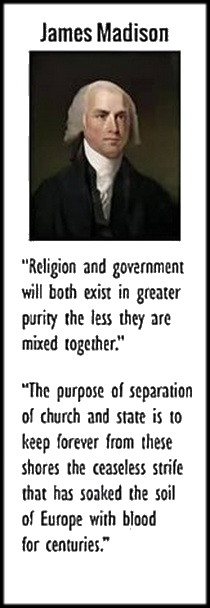
JAMES MADISON UPDATE
Another new portion of a meme I hadn’t seen before dealt with a portrayal of Madison and the “separation of religion and state.” You wanna talk about “ripped out of context”? Hoo boy.
- “There is no principle in all of Madison’s wide range of private opinions and long public career,” writes biographer Ralph Ketcham, “to which he held with greater vigor and tenacity than this one of religious liberty.” (HERITAGE FOUNDATION)
While Madison fought against anti-Catholic sentiments and inserting the word “Jesus Christ” in an amended preamble of Virginia’s Bill for Religious Liberty, he was not for separation of church n state as progressives see it. For instance, in a letter of Madison to William Bradford (September 25, 1773), Madison spoke of the desire that all public officials – including Bradford – would declare
openly and publicly their Christian beliefs and testimony:
- I have sometimes thought there could not be a stronger testimony in favor of religion or against temporal enjoyments, even the most rational and manly, than for men who occupy the most honorable and gainful departments and [who] are rising in reputation and wealth, publicly to declare their unsatisfactoriness by becoming fervent advocates in the cause of Christ; and I wish you may give in your evidence in this way.
James Madison is the author of how we view “conscience” in our public life. To wit:
In addition to his passion for religious liberty, Madison underscored that “conscience is the most sacred of all property.” Because religious rights were central to Madison’s worldview, he saw the inherent link between freedom of conscience and freedom of religion.
In particular, Madison was convinced that keeping government out of the affairs of the church (or religion) was the only way that people could follow the dictates of their conscience. He viewed established state religion as a denial of the fundamental, God-given right of conscience. Due to this, he concluded that the institution of the church should be separate from the state and not directed by the government in any way, a principle that was enshrined in his original draft of the First Amendment.
Expanding a bit on this is my post from years back, SEPARATION OF CHURCH AND STATE:
…The First Amendment never intended to separate Christian principles from government. Yet today we so often hear the First Amendment coupled with the phrase “separation of church and state. The First Amendment simply states: “Congress shall make no law respecting an establishment of religion or prohibiting the free exercise thereof.”
Obviously, the words “separation,” “church,” or “state” are not found in the First Amendment; furthermore, that phrase appears in no founding document! While most recognize the phrase “separation of church and state,” few know its source; but it is important to understand the origins of that phrase. What is the history of the First Amendment?
The process of drafting the First Amendment made the intent of the Founders abundantly clear; for before they approved the final wording, the First Amendment went through nearly a dozen different iterations and extensive discussions.
Those discussions – recorded in the Congressional Records from June 7 through September 25, 1789 – make clear their intent for the First Amendment. For example, the original version (followed by later versions) introduced in the Senate on September 3, 1789, stated:
- “Congress shall not make any law establishing any religious denomination.”
- “Congress shall make no law establishing any particular denomination.”
- “Congress shall make no law establishing any particular denomination in preference to another.”
- “Congress shall make no law establishing religion [denomination] or prohibiting the free exercise there of.”
By it, the Founders were saying: “We do not want in America what we had in Great Britain: we don’t want one denomination running the nation. We will not have Catholics, or Anglicans, or any other single denomination. We do want God’s principles, but we don’t want one denomination running the nation.”
Of interest is the proposal that George Mason – a member of the Constitutional Convention and “The Father of the Bill of Rights” – put forth for the First Amendment:
- “All men have equal, natural and unalienable right to the free exercise of religion, according to the dictates of conscience; and that no particular sect or society of Christians [denomination] ought to be favored or established by law in preference to others.”
Their intent was well understood, as evidence by court rulings after the First Amendment. For example, a 1799 court declared:
- “By our form of government, the Christian principles – we do want God’s principles – but we don’t want one denomination to run the nation.”
Again, note the emphasis: “We do want Christian principles – we do want God’s principles – but we don’t want one denomination to run the nation.”
[….]
On the day the Founding Fathers signed the Declaration of Independence, they underwent an immediate transformation. The day before, each of them had been a British citizen, living in a British colony, with thirteen crown-appointed British state governments. However, when they signed that document and separated from Greta Britain, they lost all of their State governments.
Consequently, they returned home from Philadelphia to their own States and began to create new State constitutions. Samuel Adams and John Adams helped write the Massachusetts constitution; Benjamin Rush and James Wilson helped write Pennsylvania’s constitution; George Read and Thomas McKean helped write Delaware’s constitution; the same is true in other States as well. The Supreme Court in Church of Holy Trinity v. United States (1892) pointed to these State constitutions as precedents to demonstrate the Founders’ intent.
Notice, for example, what Thomas McKean and George Read placed in the Delaware constitution:
- “Every person, who shall be chosen a member of either house, or appointed to any office or place of trust… shall… make and subscribe the following declaration, to wit: ‘I do profess faith in God the Father, and in Jesus Christ, his only Son, and in the Holy Ghost, one God, blessed forever more, and I acknowledge the Holy Scripture of the Old and New Testament to be given by divine inspiration.’”
Take note of some other State constitutions. The Pennsylvania constitution authored by Benjamin Rush and James Wilson declared:
- “And each member [of the legislature], before he takes his seat, shall make and subscribe the following declaration, viz: ‘I do believe in one God, the Creator and Governor of the Universe, the rewarded of the good and the punisher of the wicked, and I do acknowledge the Scriptures of the Old and New Testament to be given by Divine Inspiration.’”
The Massachusetts constitution, authored by Samuel Adams – the Father of the American Revolution – and John Adams, stated:
- “All persons elected must make and subscribe the following declaration, viz. ‘I do declare that I believe the Christian religion and have firm persuasions of its truth.’”
North Carolina’s constitution required that:
- “No person, who shall deny the being of God, or the truth of the [Christian] religion, or the Divine authority either of the Old or New Testaments, or who shall hold religious principles incompatible with the freedom and safety of the State, shall be capable of holding any office, or place of trust or profit in the civil department, within this State.”
You had to apply God’s principles to public service, otherwise you were not allowed to be a part of the civil government. In 1892, the Supreme Court (Church of Holy Trinity v. United States) pointed out that of the forty-four States that were then in the Union, each had some type of God-centered declaration in its constitution. Not just any God, or a general God, say a “higher power,” but thee Christian God as understood in the Judeo-Christian principles and Scriptures. This same Supreme Court was driven to explain the following:
- “This is a religious people. This is historically true. From the discovery of this continent to the present hour, there is a single voice making this affirmation…. These are not individual sayings, declarations of private persons: they are organic utterances; they speak the voice of the entire people…. These and many other matters which might be noticed, add a volume of unofficial declarations to the mass of organic utterances that this is a Christian nation.”
Madison was intimately involved in those iterations. Remember as well that Madison was a member of the committee that authored the 1776 Virginia Bill of Rights and approved of its clause declaring that:
- It is the mutual duty of all to practice Christian forbearance, love, and charity toward each other.
In 1789, Madison served on the Congressional committee which authorized, approved, and selected paid Congressional chaplains. in 1812, President Madison signed a federal bill which economically aided a Bible Society in its goal of the mass distribution of the Bible. Throughout his Presidency (1809-1816), Madison endorsed public and official religious expressions by issuing several proclamations for national days of prayer, fasting, and thanksgiving. (Much more can be found at WALLBUILDERS)
